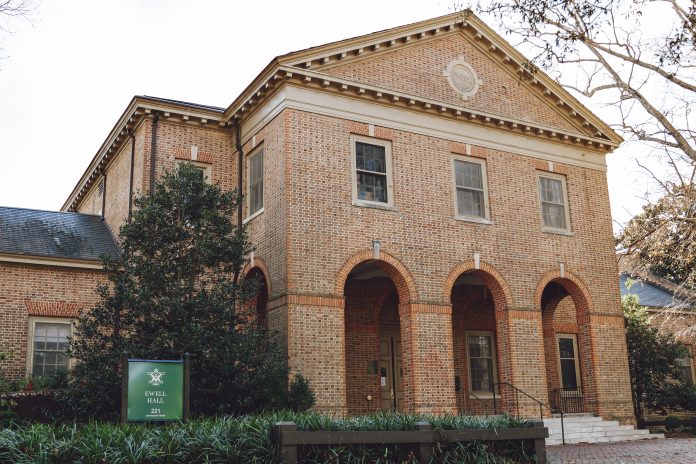Friday, Oct. 4, history professor Marc Stein of San Francisco State University re-examined America’s 1976 Bicentennial through the lens of marginalized voices in The College of William and Mary’s most recent Tyler Lecture Series event.
Speaking in Ewell Hall, Stein explored how LGBTQ+ activists and other movements reshaped the nation’s understanding of freedom, protest and identity as the United States approaches its 250th anniversary in 2026.
Stein’s analysis shed light on how these historical moments continue to influence today’s movements for social justice and inclusion.
During his lecture, Stein revisited pivotal moments from the U.S. Bicentennial, focusing on how LGBTQIA+ activists and marginalized groups used the celebrations to demand inclusion.
“The Bicentennial wasn’t just about celebrating the country’s founding—it was a moment for many to question whose freedom was being honored,” Stein said.
He highlighted the July 4th Revolution March, where LGBTQ+ activists rallied alongside other marginalized groups, including the Black Panthers and Puerto Rican and Palestinian solidarity movements to fight for civil rights.
Abigail Swanberg ’25, a history major in attendance, connected Stein’s message to her own research on public history and absorbed the broader relevance of these movements.
“It’s essential to challenge the narratives that have traditionally excluded groups like LGBTQ+ activists,” Swanberg said.
Stein emphasized that the Bicentennial celebrations, despite their patriotic veneer, became a flashpoint for activism. Marginalized groups, in particular, used the occasion to demand recognition.
LGBTQ+ activists, alongside Black, Puerto Rican and Palestinian solidarity groups, came together in what Stein described as a “profound moment of solidarity.”
Teaching professor of history Jay Watkins, one of the event organizers, echoed this sentiment and emphasized the department’s commitment to ensuring that traditionally silenced voices are included in historical narratives.
“We’re intentional about being intersectional and reflecting diverse experiences in the histories we teach,” Watkins said.
Stein’s lecture also delved into how the legacy of the Counter-Bicentennial movements continues to shape contemporary social justice efforts. He noted that the 1976 protests were a precursor to the broader recognition of intersectionality, where various marginalized communities joined forces to confront their exclusion from mainstream American narratives.
“The alliances formed during the Bicentennial laid the groundwork for today’s coalitions fighting for equality and representation,” Stein said.
As the U.S. moves toward its 250th anniversary, the same themes of inclusion, protest and identity are playing out in contemporary movements for civil rights, LGBTQ+ advocacy, and intersectional justice.
Stein also explored the political partnership between President Richard Nixon and Philadelphia Mayor Frank Rizzo.
Describing their alliance as the “erotics of nationalism and politics,” Stein explained that while the term sounds intimate, it referred to the intense, transactional nature of their political relationship.
In the 1970s, political power was often built on mutual interests rather than shared ideologies, and Stein highlighted how Nixon and Rizzo’s partnership, though not romantic, was driven by a deep desire to maintain control amid social unrest. He also pointed out how their alliance influenced broader political realignments of the 1970s and beyond.
Swanberg found this point particularly striking.
“I hadn’t realized the extent to which political relationships could mirror such intense dynamics,” Swanberg said.
Watkins added that this focus underscored the interplay between national and local power structures during the Bicentennial.
Stein also discussed Mandate magazine, a gay men’s publication that released a special Bicentennial issue in 1976 featuring eroticized imagery of men in colonial drag juxtaposed against American landmarks.
“Mandate’s issue was both a celebration and a critique,” Stein explained. “It reimagined American freedom through a queer lens, subverting traditional masculine imagery.”
The magazine was significant not only for its bold sexual content but also for its commitment to intersectionality — featuring Black and queer men in a time when representation in media was rare. Mandate gave the LGBTQ+ community a platform to challenge mainstream cultural norms while celebrating their own identities.
Stein concluded with a discussion of Elton John’s 1975 hit “Philadelphia Freedom.” While often interpreted as a patriotic anthem, Stein argued that the song carried coded messages of sexual liberation and personal freedom, especially given its dedication to Billie Jean King, a pioneering queer athlete and close friend of John.
“The song was both a tribute to King’s team and a broader reflection on freedom in all its forms,” Stein said.

